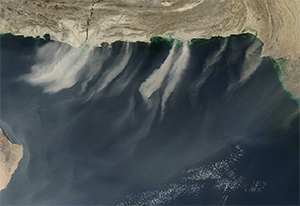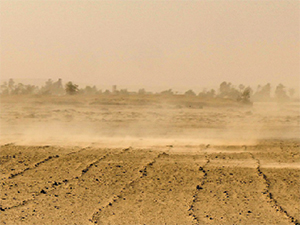The United Nations Coalition on Combating Sand and Dust Storms

In many instances, SDS source and impact regions are separated by great distances, often across international boundaries. In several recent General Assembly resolutions entitled “Combating sand and dust storms” (A/RES/70/195, A/RES/71/219, A/RES/72/225, A/RES/73/237, A/RES/74/226, A/RES/75/222 and A/RES/76/211), the UN has expressed considerable concern about the growing threat of SDS, warning that SDS may undermine the achievement of the SDGs in developing and developed countries.
In response to these UN resolutions, the UNCCD COP14 held in September 2019 in India, established a new key milestone: UNCCD Parties officially launched the UN Coalition on Combating Sand and Dust Storms, committing the UN System to a proactive approach to combat SDS, and to enhance cooperation and coordination on SDS at global, regional and sub-regional levels.
The mandate of the UN Coalition on Combating SDS as defined by the participating entities is as follows:
- Promote and coordinate a collaborative UN-system response to SDS;
- Facilitate exchange of knowledge, data and best practices among Coalition members to promote effective and coherent actions on SDS across the UN system and beyond;
- Encourage and promote collaboration on initiatives and actions among members of the Coalition, including advocacy and funding initiatives;
- Facilitate dialogue and collaboration amongst affected countries and the UN system in addressing SDS issues collectively;
- Facilitate the capacity building of Member States, raise their awareness and enhance their preparedness and response to SDS in critical regions.

The transboundary nature of SDS requires unified and coherent action. The priority of the Coalition is to directly support SDS-affected countries and foster regional and inter-regional collaboration between countries and sectors while enhancing visibility and raising awareness of SDS. These activities will catalyse global and regional actions that will support countries in facing the challenge of SDS and reduce their impact on health, the environment, agriculture and other economic activities.
The key is to facilitate sharing of knowledge and information, and to understand the sources and impacts, within and across effected sectors, to implement innovations to counter SDS. These actions are in alignment with achieving food security and natural resources management, and will ultimately contribute to achieving the SDGs.
The key partners in The UN Coalition on Combating Sand and Dust Storms, which is currently chaired by FAO are:
- International Civil Aviation Organization
- International Telecommunication Union
- International Union for Conservation of Nature
- UN Convention to Combat Desertification
- UN Development Programme
- UN Economic and Social Commission for Asia and the Pacific
- UN Economic and Social Commission for West Asia
- UN Economic Commission for Europe
- UN Educational, Scientific and Cultural Organization
- UN Environment Programme
- UN Food and Agriculture Organization
- UN Institute for Training and Research
- UN-Habitat
- World Bank
- World Health Organization
- World Meteorological Organization
